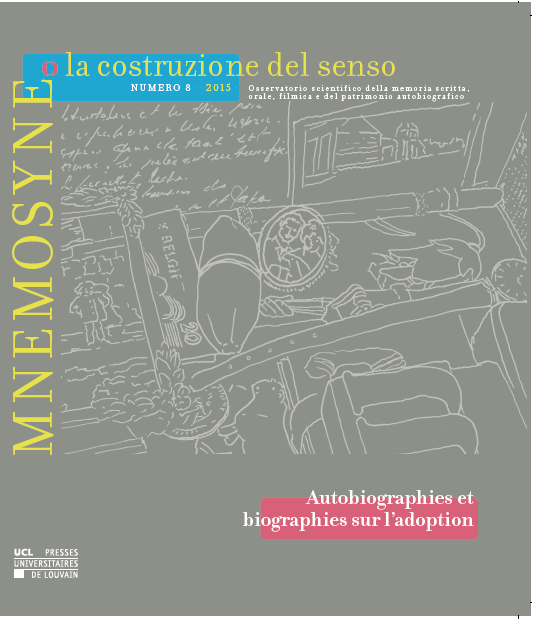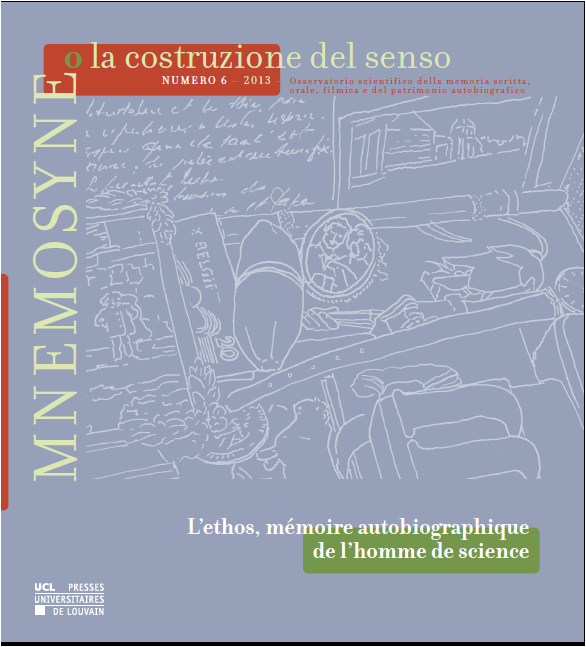Publications
Salon de la revue Paris 13-15 Octobre
Mnemosyne o la costruzione in Open access
Download the programme here
In collaboration with CSIS
The origin of Ideas into the Autobiographical
and Biographical narrations
XIV Symposium of the Scientific Observatory of the written, oral and filmic memory and of the autobiographical patrimony
Friday, June 19- Sunday, June 21 2015
Sorrento, Italy
Two different beliefs exist in western culture. On the one hand, events are thought to be completely determined by their context in materialism and its approach to the history of culture. On the other originality and individualism are highlighted in idealism. Depending on the specific notion, the act of creation is expressed differently in the natural sciences as well as in the arts. In narration, one follows a line of thought and endevours to legitimise it.
Isaac Newton’s statement “If I have seen further, it is by standing on the shoulders of giants” is in contradiction with what he repeatedly said before he died, when he explained how his intuition of the law of universal gravitation was prompted by an apple falling on his head. From scientific discoveries to artistic creations, these are anecdotes about the origin of ideas. In the texts once used in primary schools, chance played a central role in discovering words. In narration, the knack of intuition is often a product of luck. Generating ideas or discovery implies nevertheless a complex process. Carl Jung defined intuition as "perception via the unconscious": intuition enables models of the reality hidden behind the facts to be identified (Psychological Types, 1921).
The notion of intuition appears in the earliest philosophical debates. From Plato to Aristotle until the modern and contemporary philosophies, intuition has often been cited as a means of accessing the transcendental, or, as in Kant, accessing the cognitive processes through aesthetics (from the Greek aisthànomai or «I perceive by intuition»).
The expression «to grab an idea» highlights how the instant of creation is perceived as fortuitous, as ephemeral.
There are countless examples of autobiographies and biographies on this topic: from Archimedes’ Eureka, to the fish tank in Via Panisperna where Enrico Fermi states that he first understood how the power of radioactivity could be harnessed.
In narrating these events, the incidence of chance is always strongly highlighted.
In artistic creations, the ‘lightning flash’ of intuition is often referred to as having originated from a dream or a vision. From Dante’s Vita Nova to Francisco Goya’s Pinturas Negras, the inspiration for a painting or work of art originates in a kind of magic instant. In Vita di Benvenuto di Maestro Giovanni Cellini Fiorentino , scritta, per lui medesimo, in Firenze (1558), the fusion of Perseus’s bronze statue is narrated by Benvenuto Cellini in an epic style.
Where do ideas come from? How do ideas originate? How does one recognize their innovatory content? What are the circumstances of the moment of insight? To whom should the merit go? To what end is the description of intuitive thought harnessed in the autobiographical text ?
The scope of this Call for Papers is to analyse the rhetoric and the narrative construction of autobiographies and biographies dealing with the origin of ideas in any branch of knowledge.
In the specific context of autobiographies, the related bibliography is extensive both either in theoretical field and in the psychoanalytical one. There are a large number of autobiographies and biographies of scientists and artists narrating the instant of creation, the sparkle of an idea. Here are few initial references:
- Gaston Bachelard, Le Nouvel Esprit scientifique, Paris, Félix Alcan, 1934.
- Henri Bergson, La pensée et le mouvant, Paris, Félix Alcan, 1934.
- Benedetto Croce, L'Estetica come scienza dell'espressione e linguistica generale, Bari, Laterza, 1902.
- Étienne Klein, D’où viennent les idées (scientifiques)?, Paris, Manucius, « Modélisation des imaginaires », 2013.
- Mark Turner, The Origin of Ideas: Blending, Creativity, and the Human Spark, Oxford University Press, 2014.
- -Mnemosyne o la costruzione del senso, revue annuelle, (dir. B. Barbalato), «L’ethos,mémoire autobiographique de l’homme de science», 2013,
- et «Autobiographies et biographies de scientifiques entre hasard et nécessité», 2014, Presses Universitaires de Louvain.
ABSTRACT SUBMISSION
The Sessions of the 2015 XIV Symposium of the scientific Observatory Mediapolis Europa are embedded into the annual conference of the Canadian Society for Italian Studies (CSIS).
You are kindly asked to respect the following standard while submitting your proposal. The abstract has to be submitted with a CV (abstracts should contain maximum 250 words, 100 for the short CV) and mention at least two references and possibly two papers or publication by the author. Proposals have to be sent to:
This email address is being protected from spambots. You need JavaScript enabled to view it. , This email address is being protected from spambots. You need JavaScript enabled to view it.
The contributions will be peer reviewed and accepted papers will be published in special symposium proceedings: Mnemosyne o la costruzione del senso edited by Presses Universitaires de Louvain dir. Beatrice Barbalato.
Deadline to submit the proposal is no later than January the 31st, 2015.
Notification of the abstract acceptance will be given to the author by the 15th of February 2015.
Past years Symposium and activities can be consulted online at: http://mediapoliseuropa.com/
REGISTRATION FEES
1) The cost will be: 90 Euros for graduate students and Ph.D without full time employment and 120 Euros for all other delegates. Registration can be paid directly on the CSIS website http://canadiansocietyforitalianstudies.camp7.org/
2) Only if you are not a member of CSIS a registration fee of 42,00 euros (25,00 euros for graduated students) is requested for the session organized by Mediapolis Europa on The origin of Ideas and their autobiographical and biographical narrations.
Registration fees shall be paid after receiving written confirmation of the acceptance of your proposal before April 15, 2015 to Monte Paschi del Belgio. Mediapolis Europa: BE42 6430 0216 0854 - BIC : BMPBBEBB.
Partners
PAST EVENTS
- Mediapolis.Europa is happy to announce that mnemosyne o la costruzione del senso is now part of ERIH
- Mediapolis.Europa in radio fahrenheit
- Prof Beatrice Barbalato à France Culture La conversation scientifique
PAST EVENTS
- Mediapolis.Europa is happy to announce that mnemosyne o la costruzione del senso is now part of ERIH
- Mediapolis.Europa in radio fahrenheit
- Prof Beatrice Barbalato à France Culture La conversation scientifique








